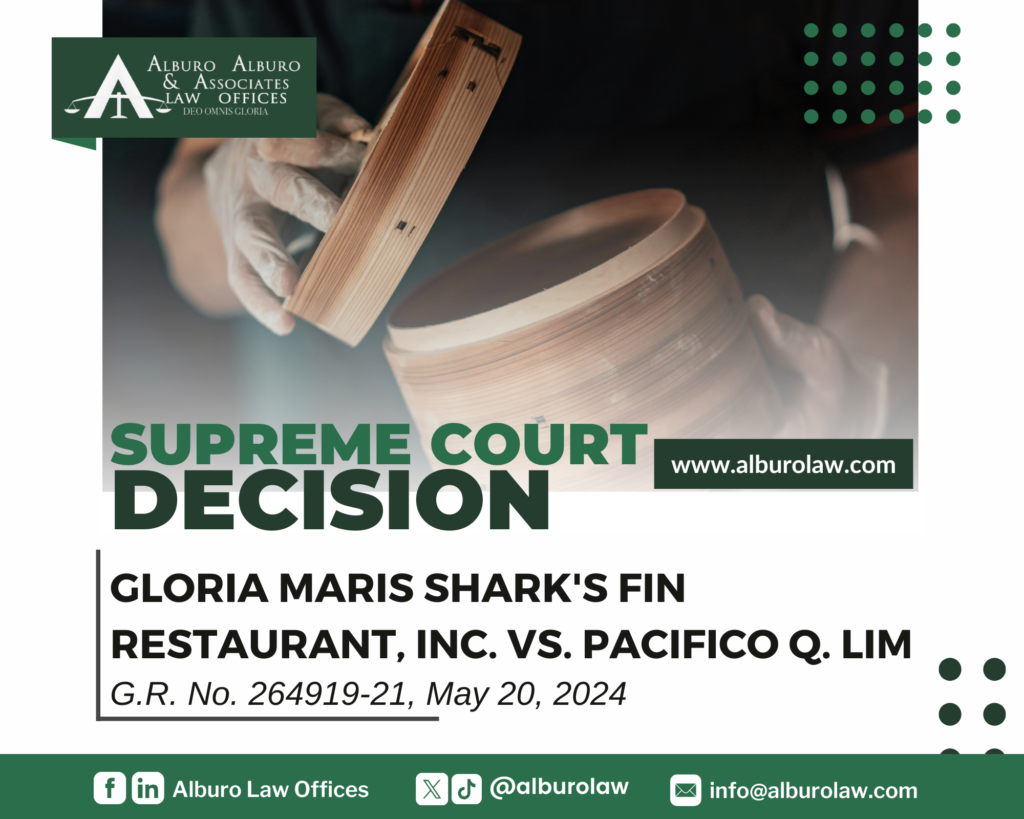
Photo from Pexels | Mikhail Nilov
The following post does not create a lawyer-client relationship between Alburo Alburo and Associates Law Offices (or any of its lawyers) and the reader. It is still best for you to engage the services of a lawyer or you may directly contact and consult Alburo Alburo and Associates Law Offices to address your specific legal concerns, if there is any.
Also, the matters contained in the following were written in accordance with the law, rules, and jurisprudence prevailing at the time of writing and posting, and do not include any future developments on the subject matter under discussion.
AT A GLANCE:
The Supreme Court held that a trademark registered in bad faith is considered as unfair competition under the IP Code. Fraud and bad faith, in terms of trademark, go hand-in-hand. There is no distinction between these concepts since one necessarily presupposes the existence of the other. Under Section 151 of the IP Code, a certificate of registration may be canceled if, among others, it was fraudulently made.
“Gloria Maris Shark’s Fin Restaurant” (Gloria Maris), a fine-dining restaurant known for serving authentic Chinese cuisine, was the recent subject of controversy arising from the fraudulent registration of the restaurant’s trademark by one of its incorporators.
Pacifico Q. Lim (Lim), an incorporator of Gloria Maris, claimed that he already conceptualized the logo of a shark’s fin enclosed in a plate of irregular shape even before Gloria Maris was established. On the contrary, Gloria Maris claimed that it actually hired a graphic artist to submit a sample drawing of the trademark. After Gloria Maris’ Board of Directors’ approval of the trademark, they entrusted Lim with the registration of the said trademark with the Intellectual Property Office (IPO) on behalf of Gloria Maris.
In 2005 or more than a decade after Gloria Maris’ SEC registration, three (3) trademarks were registered with the IPO, namely “GLORIA MARIS WOK SHOP & DESIGN”, “GLORIA MARIS KITCHEN WITH LOGO AND DESIGN” and “GLORIA MARIS SHARK’S FIN RESTAURANT”. These were all registered under the name of Lim.
Gloria Maris, aware of Lim’s fraudulent registration, filed separate petitions to cancel all three (3) trademarks.
The Bureau of Legal Affairs of the IPO (BLA-IPO) decided in favor of Lim, pointing out that the marks were coined or created by Lim prior to Gloria Maris’ registration with the SEC. Moreover, Gloria Maris was not able to present any evidence that it authorized Lim to register the Gloria Maris trademark on its behalf. Furthermore, none of Gloria Maris’ officials opposed the trademark application filed by Lim after its publication in the IPO Gazette.
The Office of the Director General (ODG) reversed the decisions of the BLA-IPO, giving weight to the fact Gloria Maris had already been using the said trademark more than ten (10) years before Lim’s registration.
The Court of Appeals reinstated the decisions of the BLA-IPO, on the basis that the documents submitted by Gloria Maris were not sufficient to overcome Lim’s prima facie ownership of the Gloria Maris trademark.
SUPREME COURT’S DECISION
The Supreme Court ruled in favor of Gloria Maris on the basis that the latter was able to prove through substantial evidence that it had been using the name “Gloria Maris” several years before Lim’s registration. Moreover, Lim’s knowledge of Gloria Maris’s prior active use of the trademark was evident, considering that he was one of the restaurant’s incorporators and remained as a shareholder of the restaurant even after he registered the trademarks under his own name.
Sec. 168 of the IP Code provides that a trademark registered in bad faith is considered as unfair competition under the IP Code, to wit:
“SEC. 168 Unfair Competition, Rights, Regulation and Remedies.
168.2. Any person who shall employ deception or any other means contrary to good faith by which he shall pass off the goods manufactured by him or in which he deals, or his business, or services for those of the one having established goodwill, or who shall commit any acts calculated to produce said result, shall be guilty of unfair competition, and shall be subject to an action therefor.”
Under Section 151 of the IP Code, a certificate of registration may be canceled, if it was fraudulently made. It has been held that fraud and bad faith, in terms of trademark, go hand-in-hand and that one necessarily presupposes the existence of the other.
Therefore, considering the foregoing, the Court ordered that the Certificates of Registration of the subject trademarks in the name of Lim be canceled.
Source:
Gloria Maris Shark’s Fin Restaurant, Inc. vs. Pacifico Q. Lim, G.R. No. 264919-21. May 20, 2024
Click here to subscribe to our newsletter
Alburo Alburo and Associates Law Offices specializes in business law and labor law consulting. For inquiries regarding legal services, you may reach us at info@alburolaw.com, or dial us at (02)7745-4391/ 0917-5772207/ 09778050020.
All rights reserved.


